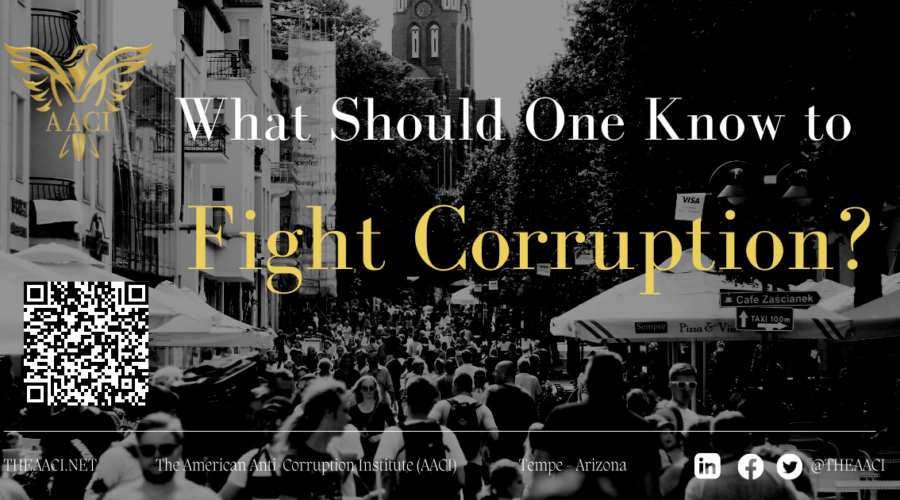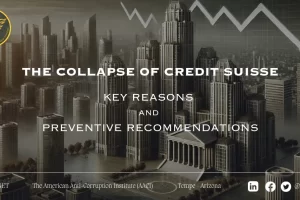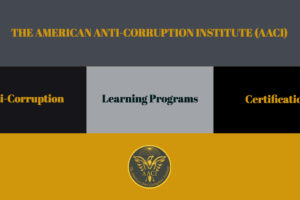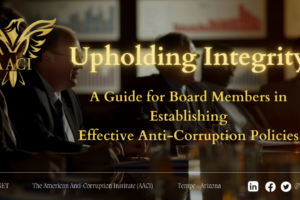Technical Staff
June 10, 2022
The Definition of Corruption
The American Anti-Corruption Institute (AACI) defines corruption as “Abuse of power or perceived power or entrusted authority for direct or indirect private monetary or non monetary gain.” 1 Therefore, the existence of power is a prerequisite for corruption. Power has many forms and sources. For example, public officials have their respective powers derived from their contracts with their employers. The board member’s authority stems from the company’s bylaws and applicable local legislation. Each of these authorities serves as an agent for a principal. Each of these officials has a fiduciary obligation, a care duty, and a loyalty duty.
What Is the Ultimate Authority in Defining Corruption?
Local laws define what constitutes corruption. Corruption is a legal term, not a management term. As a result, what would be classed as corrupt behavior in nation A may be classified as non-corrupt behavior in country B. Thus, theft is not legally corrupt: one must distinguish between thieves and corrupts!
The Nature of Corruption
Normally, it is designed and executed in secrecy. On average, a corrupt act takes between 2 and 35 years to uncover. For example, Maddof’s ponzi scheme lasted more than 30 years before falling down. Bid rigging, kickbacks, misappropriation of assets, and nepotism are examples of corrupt conduct. There are many types of corruption that employees and citizens should be aware of to prevent and deter fraud and corruption. When one does not know what corruption is, he will not see it even when one falls on it.

When one does not know what corruption is, he will not see it even when one falls on it.
The American Anti-Corruption Institute (AACI)
Who Should Know What?
Each citizen must fight corruption. It is the most dangerous enemy for each nation. As a result, the government, private sector, and civil society should “arm” their employees and constituents with the know-how that makes them effective and efficient in fighting this invisible evil. No one solution fits all. But there must be a national commitment to unleash the collective nation’s energy to eradicate corruption. However, nations need not start from scratch.
The United Nations Convention Against Corruption (UNCAC)
The United Nations Convention Against Corruption is the only legally binding universal anti- corruption instrument. The Convention’s far-reaching approach and the mandatory character of many of its provisions make it a unique tool for developing a comprehensive response to a global problem. The vast majority of United Nations Member States are parties to the Convention. The Convention covers many different forms of corruption, such as bribery, trading in influence, abuse of functions, and various acts of corruption in the private sector.2
In addition, The American Anti-Corruption Institute (AACI) encourages countries and organizations to adopt the Ten Principles of Fighting Corruption. These principles form a proper and effective foundation to eradicate corruption.

Conclusion
One should be equipped with the proper knowledge and skills to enable him to fulfill his duties towards his nation and country in the fight against corruption. Otherwise, corruption wins. It must not.
NOTES
1 Exam Unit, “Fraud and Corruption,” Certified Anti-Corruption Manager (CACM) Review Textbook, 2022 ed. (United States of America: The Exam Unit of The American Anti-Corruption Institute LLC., January 14, 2022) page 195.
2 United Nations Office on Drugs and Crime, https://www.unodc.org/unodc/en/corruption/uncac.html Accessed on February 4, 2018











































